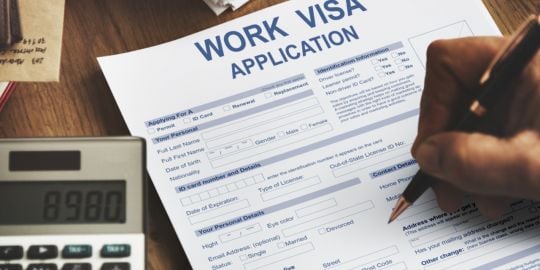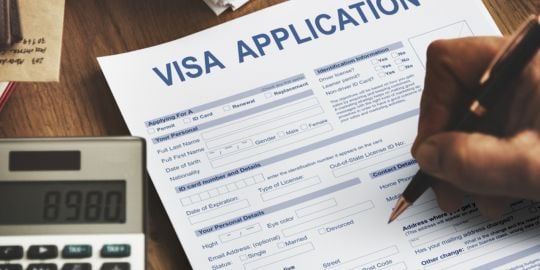My wife and I are thinking about moving close to her hometown so she can be close to family. So from USA to Brazil. How long would it take for me to get a visa to start working?
How Long To Get Permanent Visa if Married
Hi Will,
You can apply for the Permanent Visa at the Consulate there in the USA, in which case it will generally take 3 to 6 months or more to be issued. The catch there is that you can't come to Brazil permanently until it has been issued.
The other alternative, which is the one I would suggest is to get all your documentation in order, apply for a Tourist Visa and then go immediately to the Federal Police and apply for the Permanent Visa (com base em cônjuge brasileira) here in Brazil. The extra bureaucracy here means excessive delays in it actually being issued. The great advantage of this route is that once you've received the "protocolo" and the attached SINCRE (computer printout) from the Feds you can stay in Brazil and obtain your Carteira de Trabalho (work permit) until the process is completed. Here you can expect to wait up to two years to get the Permanent Visa process completed.
Cheers,
William James Woodward - Brazil Animator, Expat-blog Team
Hello,
MY wife and i will be moving to Brasil next year. She is Brasilian and i am English. (we got married in the UK)
I want to get a permanent marriage visa before going but i have heard that , once issued, you have to go to Brasil within 90 days or the visa wont be valid ( im not sure when i will be going though as it will depend on the sale of my house here and so i cant guarantee that i will be able to go to Brasil within 90 days of issue).
so i have a few questions;
1) Is it easier to apply for it once i get to Brasil and if so can i legally work /get a bank account and buy property whilst i wait for it?
2) What docs would i have to take with me and would they have to be legalised by a consulate in the uk before going?
3) If easier to get a visa here in the uk - Can i do it by post or will i have to go to the consulate in london and apply in person?
4) What docs do i have to take/post to the consulate in london when applying?
If someone could give me some advice that would be great
thanks
Duncan
Hi Duncan,
There is absolutely no way to predict exactly how long the viaa application will take to process, every case is different. The only thing that I can tell you is that generally speaking applications made abroad are dealt with quicker than they are here in Brazil. There it may be as little as 3 - 6 months while here in Brazil even with all the documentation in order it usually takes over a year and at times up to 3 years.
You will not be able to come to Brazil until the visa is issued if you apply abroad, then you have 90 days - no ifs, ands or buts. If you apply here then you first must register the foreign marriage with the Consulado-Geral do Brasil at home, they will issue another Marriage Certificate from the Consular Cartório, which is valid in Brazil. At this time you should be getting ALL of the other documents that you'll need for the visa process ready.
If you come to Brazil on a tourist visa, once that new Marriage Certificate has been issued, then you can apply for the VIPER Permanent Visa here at any time during the validity of your visa stay. Once you've applied for permanency based either on marriage to a Brazilian or based on a Brazilian child that carries with it the right to remain in Brazil, obtain a Carteira de Trabalho and work, during the period of processing the visa, no matter how long that takes.
The bank account is a whole different issue, it's likely you won't be able to open one until you've actually got the visa in hand. Even then it is an extremely bureaucratic and difficult process, so much so that many expats just give up. What I'd recommend in the timebeing is that you open an account with an international bank like HSBC or Citibank which also operates here in Brazil, especially if you will continue to have foreign sourced income. You will be able to withdraw funds from that account at any HSBC or Citibank ATM here, based on their daily limits, you will also be able to use a credit card issued on that account, but the debit card will not work for direct debit purchases here in Brazil.
For the documents you'll need for the VIPER Permanent Visa process read that part of the following posting:
https://www.expat.com/forum/viewtopic.php?id=280525
Personally, even though it is a bit more legwork I'd recommend that you get the marriage recognized by the Consulado, then come here with a tourist visa once you've concluded your negotiations there, apply for the VIPER here. You should also use that time to get all the documents you'll require ready. Cheers,
Cheers, 
William James Woodward – Brazil Animator, Expat-blog Team
Hi there, many thanks for your reply, especially about the bank accounts. On reflection i think i will try and get the visa here as i suspect i will need a bank account of some sort to buy a property in Brasil( which is more or less the first thing i will probably do).
I see you are in Macae. I think that is close to Arraial do Cabo? (where we are moving to) do you know much about Arraial? it would be good to get some idea before i go.
thanks again for the info
Duncan
You won't need a bank account to buy property in Brazil, you can transfer the funds directly to the account of the seller.
Be careful what you buy and who you buy from.
HI there thanks for that
As for buying: i am a little confused as to the difference between
RGI / Registrado / posse / escritura etc etc
from what i can make out RGI is the same as registrado? and they are the ones to buy as they will be registered by Law / at the land registry is that correct?
As for posse i'm assuming that they have no registry / planning permission and therefore in most cases could, in theory , be subject to someone knocking at my door one day telling me it needs to be demolished or something similar?
and what is escritura?
I have also heard that if a property has been there for 20 years then a "posse" house can be registered or becomes registerd by default. Again i am not sure so if you could give me some advice as to the differences and any pitfalls to look out for that would be great! (if you have time reply!)
(Im also calculating that i will have to pay 6-7% on top of the asking price for fees/taxes/lawyer fees etc )
sorry, lots of questions i am afraid..
Thanks
Duncan
Hi Duncan,
As lawyer_rio will surely confirm, purchase of real estate in Brazil is not an extremely complex process, but there are certain details you need to pay close atention to in order not to have any problems. No matter how straightforward the deal may be, it is always wise to pass everything over to a lawyer (regardless of how reputable the realtor) just to make sure everything is completely in order.
Regarding the terms you're doubtful of:
RGI (Registro Geral do Imóvel) is the unique registration number assigned to the property by the Cartório de Registro do Imóveis.
Registrado simply indicates that the property is indeed registered with the Cartório
posse (possession) is the effective date when the transfer of the property takes place, usually if there is a structure this is the date on which you receive the keys. Date of posse is also the date (in most cases) from which all financial responsiblity regarding that property passes to the purchaser.
Escritura is the deed/title itself which is what you will register in the Cartório.
A couple of pitfalls to be aware of, in Brazil the law recognizes "squatter's rights" here it is called usucapião which is a means by which a person can obtain title to a property following 5 years of peaceful and uncontested occupation of said property. This makes a title search and actually seeing the property essential. You don't want to end up buying something that is occupied by someone you can't easily remove from the property, nor do you want to get stung by buying property from someone whose title is in dispute by virtue of usucapião. This is one of the reasons it's really wise to have a lawyer look things over.
You also want to see all the paid utility bills or a declaration from the utility company that there are no outstanding debts, these pass with the property and you can be held responsible for paying somebody else's debts if you're not careful. There are other debts that may also be encumberances on the title.
Many properties are not registered, have buildings that are "irregular" meaning that they were never approved and had proper permits. This is something you really need to check into. Also there is a document called "Hibite-se" which essentially is a declaration that it meets the standards and is fit for occupancy. Banks in Brazil will not finance properties that do not have a Habite-se, if you purchase paying the entire balance of the transaction it's not a big problem, but if you ever want to re-sell the property you're going to have a really difficult time of it, since you're going to be limited to selling to somebody who can afford a "cash only" deal or you'll have to obtain the Habite-se for the property yourself.
Regarding the formalities of purchase, all you really need is a CPF number and identifications (i.e. your passport). If you're still abroad and wish to purchase here, it is possible to do so and you can obtain a CPF through the Consulado-Geral do Brasil nearest you, so that won't be a big problem.
If you have any further doubts, don't hesitate to ask. If I don't have an answer for you certainly lawyer_rio or some of our other members who are experienced with land transactions will be able to give you lots of information. Cheers,
Cheers, 
William James Woodward – Brazil Animator, Expat-blog Team
Posse has nothing to do with ownership. The English translation would amount to squatter. It's a factual situation from which rights can be derived, and it can lead to ownership by "usucapião" or acquisitional prescription. However not all types of posse can lead to ownership, for example if the state is the owner.
Posse can change hands by "cessão de direitos" and it's also custom to register that contract. It does however not make you owner.
Unfortunately a lot of foreigners get screwed, so having a lawyer is a good idea, and not the one indicated by your friendly realtor.
And that first frase was not a personal attack.
Ill come back on it (posse and usucapiao) tomorrow.
No definitely not a personal attack, it was actually a recommendation.
Thanks for clearing up my misunderstanding of posse, the only experience I had with that was when I bought a home in MG. I was unaware that it had other meanings too.
I agree with Sven, don't use a lawyer refered by the realtor, pick your own even if the realtor tells you you'll get a discount on fees if you use his referral. You'll pay more, but you can rest assured the lawyer will be working for YOU and looking after your interests. Cheers,
Cheers, 
William James Woodward – Brazil Animator, Expat-blog Team
A better translation actually would be "possession". Not every owner has posse (ex: if you buy property in an auction by Caixa which still has the old owner in it, or when MST has taken posse of your farm). A renter has posse, a renter has posse and even an assailant has posse.
It is the factual situation whereby a person has possession of an object and exercises some of the rights attached to property, without being the actual owner.
system7 wrote:HI there thanks for that
As for buying: i am a little confused as to the difference between
RGI / Registrado / posse / escritura etc etc
Coming back to this with a little time on my hands.
RGI is the Registro Geral dos Imoveis, or (land) title office.
Matricula is a number that identifies each single piece of real estate. It's a piece of paper describing the real estate, it's original owner (this form or registering only exists since 1976) and all subsequent sales.
Escritura (Pública) is the "title", it's made up by an official and describes the piece of real estate, the type of transaction and the buyer and seller. It's a worthless piece of paper unless it's registered with the RGI as one of the subsequent sale.
One does not become owner by having made up the Escritura Pública, one only becomes owner after the title is registered with the RGI.
Some properties in Brazil might not have a Matricula, because nothing happened to the piece of real estate after 1976 that warrants creation of a matricula. Finding out who is the actual owner in that case is a complex undertaking.
system7 wrote:As for posse i'm assuming that they have no registry / planning permission and therefore in most cases could, in theory , be subject to someone knocking at my door one day telling me it needs to be demolished or something similar?
Posse is a factual situation, as I mentioned before from which rights can be derived. Posse can be passed to others by cessão de direitos. Depending of the type of posse and who is the actual owner, one can become owner by the time-lapse of 5, 10, 15.
system7 wrote:and what is escritura?
As I said, it's the title of the land/home, made up by a cartorio, and worthless unless registered in the RGI.
It's not entirely worthless, it's a binding agreement between buyer and seller. However, if the buyer doesn't register the title, the seller remains owner. (meaning he can sell again among other things)
system7 wrote:Again i am not sure so if you could give me some advice as to the differences and any pitfalls to look out for that would be great! (if you have time reply!)
Safest would be to stay away from posse, unless you have the advice of a lawyer.
system7 wrote:(Im also calculating that i will have to pay 6-7% on top of the asking price for fees/taxes/lawyer fees etc )
Taxes: depend on the state law, in Rio, it's 2%.
Cartorio fees: the courts establshed a fixed prices, depending on the price of the real estate.
Lawyer: the bar association provides a minimum price for several types of service. Basically you can negotiate with the lawyer.
Hello and thank you both for all the detailed information.
I have been trying to find out about this for a while and have not had much luck so thankyou again for making things a lot clearer for me!
I'll have a look through in a bit more detail when i have time and if possible may bother you with a few more questions over the coming months....
At the moment though it looks like RGI/Registrado is the way to go with a Lawyer not recommended by the estate agent!
Thanks again
Duncan









